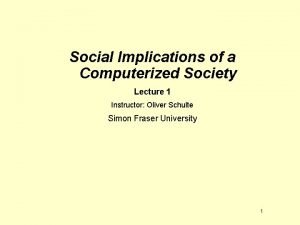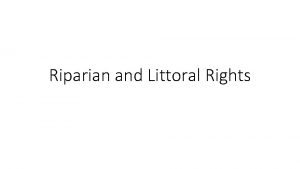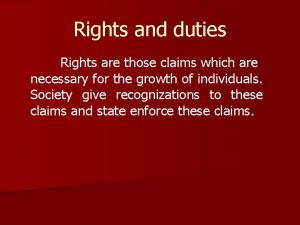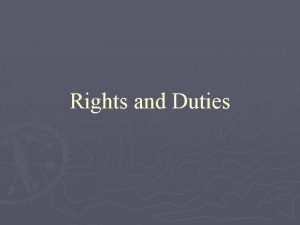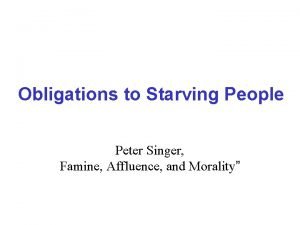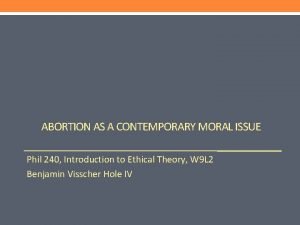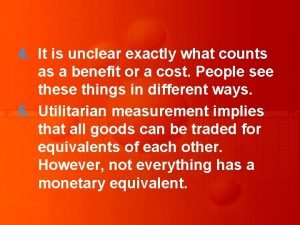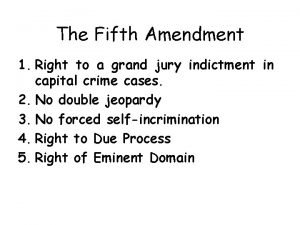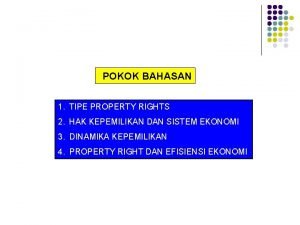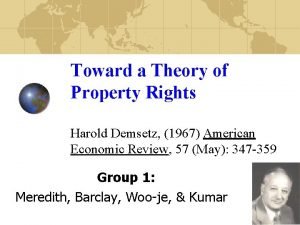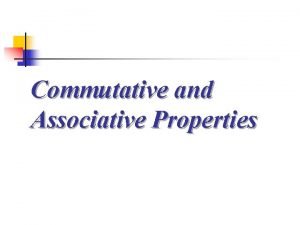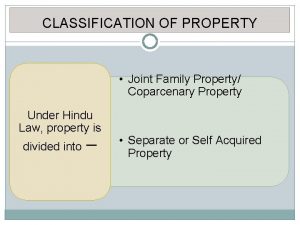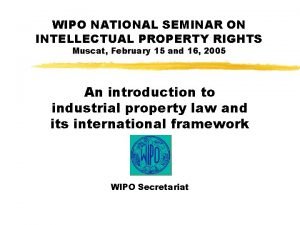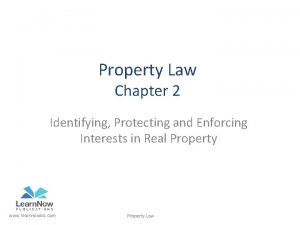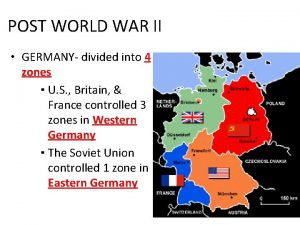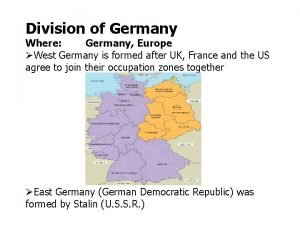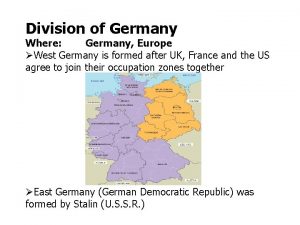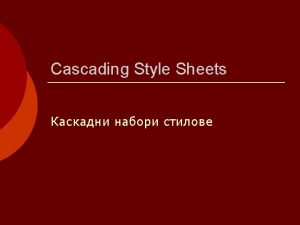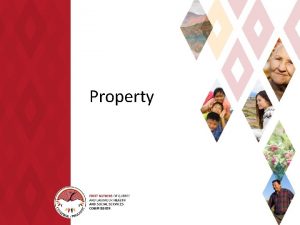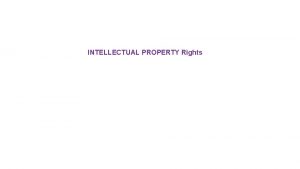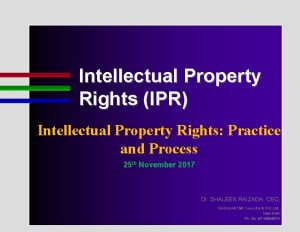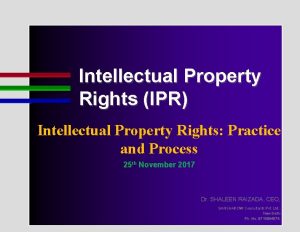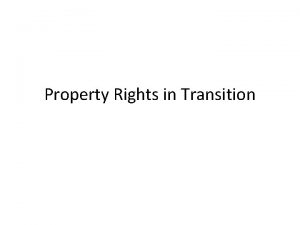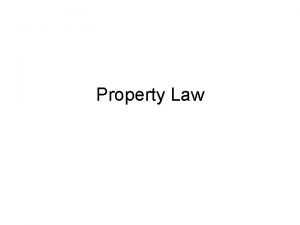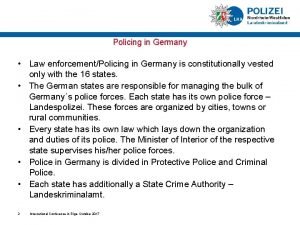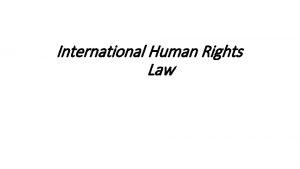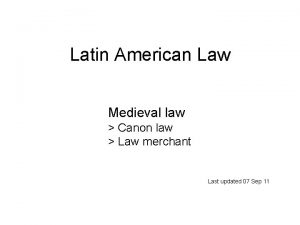Property Rights in Germany Property Law What is

































- Slides: 33

Property Rights in Germany

Property Law • What is property law ? • In the most general terms, the law of property is the law dealing with things. These things may either be: • tangible (corporeal) or • intangible ( incorporeal )

BGB, Propert Rights, Background • The German Civil Code, the Burgerliches Gesetzbuch (BGB), dates from 1 January 1900. • The BGB operates on a sharp distinction between the law of obligations and the law of property. German law is, like French law, heavily based on Roman Law. The property rights that are recognized largely a repetition of the Roman catalogue of property rights. • The law of contract is used to achieve effects that cannot be achieved by property law alone. There is a term called ''the Trenennungsprinzip'‘. • The German BGB strictly adheres to the number numerus clasusus of property rights. German property law scholars generally hold that only property rights dealt with by the Civil Code can be property rights.

Numerus Clausus • Property rights are rights that have effects against third parties. Parties are not completely free in the creation of these rights. • in any legal system some limitation can be found with regard to: • (a) the number and content of property rights as well as • (b) the way in which these rights can be created, transferred or destroyed. • This is called the principle of numerus clausus.

Numerus Clausus (DE) • In Germany property law must, to ensure its independence, deal with the creation of property rights according to its own principles. The parties involved cannot be free to create any right, which sees to an object, and provide property effect to it. The starting point of the freedom of contract, that governs the law of obligations, does not apply to the law of property. Here, the opposite applies: the parties involved can only create those rights, which are allowed by the law. The number of property rights is therefore necessarily closed.

The protection of property rights • La possession and possessory claims: • Based on Roman law distinction between possesorium and petitorium, mostly civil law systems distinguish between ownership and possession. Whilst ownership and the limited property rights deal with the legal entitlements a person may have with respect to an object, possession relates primarily to the factual control of an object. In civil law systems possession servers several important functions. Possession of an object indicates the existence of a property right and thus makes it public. German law provide for a legal presumption that the possessor of a movable object is also its owner ( 1006 BGB ). The civil law systems provide for specific instruments for the protection of which are granted regardless of the legal entitlement the possessor enjoys with respect to the object. Possessory protection serves to prevent unlwaful and violent behaviour and thus shall enhance the preservation of peace in a society.

The Protection of Propety Rights -> POSSESSION • The BGB does not provide for a general definition of possession, but rather concentrates on the aspect of the protection of possession. • Possession is understood in a very broad sense as the actual control of a corporeal object. It comprises movables as well as immovable property and, as is explicitly provided by 865 BGB • Part Possession 865 BGB -> a person who possesses only part of a object, particularly separate rooms for housing purposes or rooms for other purposes. may also extend only to an integral part of a object, eg one room of a house or apartment. • Possession can be shared by several persons co-possesion 866 BGB -> If several persons share the possession of a object, in relation to each other no protection of possession takes place insofar as it concerns the limits of the use to which each of them is entitled. • If all the co-possessors can use the object jointly together, one speaks of joint possession.

The Protection of Propety Rights -> POSSESSION • German law distinguishes between diffrent types of possession, namely between Eigenbesitz and Fremdbesits and direct (unmittelbarer) and indirect possession (mittelbarer Besitz). The distinction between Eigenbesitz and Fremdbesitz depends on the intention of the possessor. A person who holds an object for himself is Eigenbesitzer 872 BGB Possession as owner -> A person who possesses an object as belonging to him is a self-possessor), no matter whether he is rightful owner or even a thief, while a person who holds an object for another is a Fremdbesidzer. Examples of a Fremdbesitzer are the tenant, the depositary, or the borrower of a object. Accordingly, the finder of an object is Eigenbesitzer, if he wants to keep the object for himself, or Fremdbesitzer, if he has the intention to return it. Eigenbesitzer and Fremdbesitzer are possesors and thus enjoy the legal protection of possession.

The Protection of Propety Rights -> POSSESSION • There is a division between the direct possessor which has acutal control of the object, and the indirect possessor exercises his possession not in person, but by an intermidiary. This intermediary is called Besitzmittler. 868 BGB enumerates some examples of indirect possession. • 868 Indirect possession -> If a person possesses an object as a usufructuary, a pledgee, a lessee, a tenant, a depositary or in similar relationship, by virtue of which he is as against other entitled, or obliged, to have possession for a period of time, the other person is also a possessor. • Contrary to the servant in possession ( Besitzdiener, 855 BGB -> If a person exercises actual control over an object for another in the other's house-hold or business or in a similar relationship, by virtue of which he has to follow the other's directives relating to the object, so only the other is possessor. ) This person is only an agent without any right of his own, the Besitzmittler has the possession of a posserssor and enjoys, as well as the indirect possessor, possessory protection. He is direct possessor and, as he does not possess the object as an owner, but only according to a specific entitlement, he is a Fremdbesitzer.

The Protection of Propety Rights -> POSSESSION • Direct possession is aquired by gaining actual control of the object (854(1) BGB). • 854(1) Acquisition of possession -> Possession of an object is acquired by obtaining actual control of the object. • This can be done by way of original aquisition or by way of transfer ( deliverative aquisition ). While direct possession is primarily acquired in a factual way, the creation of indirect possession is the result of a legal transaction (eg the creation of a lease and delivery of possession of the leased object).

The Protection of Property Rights -> Self Help • German law attributes important legal consequences to the actual control over a object, over and above the interdiction of unlawful interference 858 BGB: • 858 (1) BGB Whoever deprives the possessor against his will of the possession or interferes with the possession acts, except where the deprivation or interference is permitted by law, unlawfully (unlawful interference). • 858 (2) BGB The possession obtained as a result of unlawful interference is defective. The successor in possession must allow the defectiveness to be asserted against him if he is the heir of the possessor or if he knows when he acquires possession of the defectiveness of his precedecessor's possession.

The Protection of Property Rights -> Self Help • Actual interference entitles the possessor to self-help. German law distinguishes two sorts of self-help, the Bezitzwerhr (859(1) BGB) and the Besithkehr (859(2) and (3) BGB). • 859(1) BGB Self help by possessor -> the possessor may ward off unlawful interference by use of force. • 859(2) BGB -> If a moveable object is taken away from the possessor by means of unlawful interference, the possessor may use force to remove the object from the perpetrator caught in the act or pursued. • 859(3) BGB -> The possessor of a parcel who is deprived of possession by unlawful interference may recover possession immediately after the deprivation by dispossession of the perpetrator. • Besitzwehr is a specific form of self-defence against actual force, whilst Besitzkehr entitles the possessor to recover the object from the dispossessor immediately after the interfering time. The right to exercise self-help applies to the direct possessor and the servant in possession.

The Protection of Property Rights -> Assertion of ownership • Assertion of ownership (rei vindicatio) • In German law the owner of an object has the right to request the return of the object from any person who holds the object without sufficient entitlement (unlawful possessor). This specific claim is provided by 985 BGB Recovery of property > the owner may claim from the possessor the return of the object. and specific claim extends equally to movable and immovable property. In order to recover the object the owner must prove his ownership and that the defendant has direct or indirect possession of the object. Then it is up to the possessor to prove his right to possession. • In order to prove ownership the owner can rely on the presumption of ownership as provided by 891 BGB for parcels and by 1006 for movables. The right to recovery also obtains to the co-owner of an object (1011 BGB).

The Protection of Property Rights -> Assertion of ownership • • • 891 BGB -> Statutory presumption (1)If a right has been entered in the Land Register for a person, it is presumed that the person is entitled to this right. (2)If a right entered in the Land Register is deleted, it is presumed that the right does not exist. 1006 BGB -> Presumption of ownership for possessor (1)It is presumed in favour of the possessor of a movable thing that he is the owner of the thing. However, this does not apply in relation to a former possessor from whom the thing was stolen or who lost it or whose possession of it ended in another way, unless the thing is money or bearer instruments. (2)It is presumed in favour of a former possessor that during the period of his possession he was the owner. (3)In the case of indirect possession, the presumption is in favour of the indirect possessor. 1011 BGB -> Claims arising from co-ownership Each co-owner may assert the claims arising from the ownership against third parties with regard to the thing as a whole, but the claim to return only in accordance with section 432.

The Protection of Property Rights -> Assertion of ownership • • The co-owner may either claim the granting of joint possession, or the recovery of the whole object. The possessor is not obliged to return the object if he has a right to possession. This right may derive a property right ( eg usufruct, servitude, pledge, or an acquisition right), a contract ( eg sale, tenancy agreement) or another legal obligation (eg to spouse's right to use the matrimonial home). The right to claim the return of the object is also blocked by a retention right under 273 or 1003 BGB. 273 BGB -> Right of retention (1)If the obligor has a claim that is due against the obligee under the same legal relationship as that on which the obligation is based, he may, unless the obligation leads to a different conclusion, refuse the performance owed by him, until the performance owed to him is rendered (right of retention). (2)A person who is obliged to return an object has the same right, if he is entitled to a claim that is due on account of outlays for the object or on account of damage caused to him by the object, unless he obtained the object by means of an intentionally committed tort. (3)The obligee may avert the exercise of the right of retention by providing security. The providing of security by guarantors is excluded.

The Protection of Property Rights -> Assertion of ownership • 1003 BGB -> Right to satisfaction of the possessor • (1)The possessor may, notifying the amount required as reimbursement, require the owner to state, within a reasonable period determined by the possessor, whether he ratifies the outlays. After the expiry of the period, the possessor is entitled to seek satisfaction from the thing under the provisions on the sale of a pledged item, and in the case of a plot of land under the provisions on execution of judgment on immovable property, if the ratification is not made in good time. • • (2)Where the owner denies the claim before the expiry of the period, the possessor may satisfy himself from the thing only when, after the amount of the outlays has been finally and non-appealably established, he has called on the owner, laying down a reasonable period of time, to make a statement, and the period has passed; the right to satisfaction from the thing is excluded if the ratification is made in good time.

Types of Property Rights -> Ownership • The right of ownership is the most extensive property right known to civil law systems. For that reason, the rights of the owner are also the most extensive. The rights of the owner can be seen from two different perspectives. The firs concerns the relationship of the owner towards the object owned. Each of civilian systems deals with this issue in their definition of the right of ownership. • The German definition in section 903 BGB allows the owner to use the object as he thinks fit. • Section 903 BGB -> Powers of the owner: • The owner of a thing may, to the extent that a statute or thirdparty rights do not conflict with this, deal with the thing at his discretion and exclude others from every influence. The owner of an animal must, when exercising his powers, take into account the special provisions for the protection of animals.

Types of Property Rights -> Ownership • Ownership is seen as an indivisible power over an object. The right of ownership cannot therefore be seperated out into more limited types of ownership. Instead, another person holding a property right over the same asset will hold it as a ius in re aliena (right in the land) or limited property right, and not as an owner. In such case, the right of ownership remains whole, though with another property right burdening it. • German law offers one complication to this system in that, unlike other civil law systems, it allows a person to have some limited property rights on his own object of ownership. In such a situation, which can only concern a property right on an immovable, a person is both owner and holder of a limited property right over the same object at the same time. • The German right of ownership is the conception of ownership advocated by, inter alia, von Savigny: the right of ownership is considered the most absolute and total power over a corporeal object. Objects other than corporeal objects ( Sache ) are excluded from the scope of property rights. Under this approach, ownership is seen as an indivisible power over corporeal objects.

Types of Property Rights -> Coownership • Co-ownership is not a separate property right, but its part of the concept of ownership. • in general, civil law systems all use a similar approach to coownership. The reason is not surprising, as they all share a common concept of ownership. A unitary concept of ownership does not allow for a fragmentation of ownership, at least not in a such a way that two different rights of ownership can come into existence. • German law recognises a form of co-ownership similar to Dutch law, but additionally a second type. This similar type is a right of coownership in equal, undivided shares. This ownership in undivided shares or Miteigentum nach Bruchteilen is dealt with in 741 BGB and 1008 BGB. • The second type of co-ownership is a pure type of co-ownership and is characterised by an undividable community over which the owners can only acting together exercise their powers. This second type of co-ownership only exists where specifically provided for by legislation. These are partnerships in company law, a marriage, or the receipt of an inheritance.

Security Ownership => Real Servitudes • • • The law on real servitudes has its basis in Roman law. Real Servitudes are property rights which burden a piece of land, there are no real servitudes on movable objects. Its clearly shown in section 1018 of BGB -> A piece of land can, for the benefit of an owner of another piece of land, be burdened in such a way, in which the owner may use this piece of land for specific purposes or in which on the piece of land certain action cannot be taken or a certain right which follows from the burdened piece of land against the other piece of land cannot be exercised. First and foremost, a real servitude is a property right which comes into existence between two owners of a piece of land. The right of real servitude limits the ownership of the owner over which the burden runs and not the owner himself. In that respect, German version refer to Grund (land). In principle, a right of servitude burdens the land alone and only requires the owner of that land to tolerate or not to do something. A right of servitude requires two pieces of land. Traditionally these pieces are known as the dominant and servient land. The owner of the servient land must tolerate a specific act of the owner of the dominant land over his land. Another requirement is that it is the dominant land which should benefit from the existence of the servitude and not just the owner himself. The requirement of benefit restricts the content of the servitude. When one piece of land must benefit from another piece of land, the law considers that these two pieces of land must be near each other.

Types of Property Rights -> Personal Servitudes (Usufruct) • • A personal servitude is a property right established on behalf of a person as such and not in his capacity as owner. The property right is therefore connected to the person holding the right. Because these rights are property rights, the term personal servitude may sound confusing. In general, when the person holding the right ceases to exist, the right also ceases to exist. Because of this connection to a person, the word 'personal' is added to the general word 'servitude'. The category of personal servitudes comprises the right of usufruct, and the rights of use and habitation. Usufruct, as the most important amongst the personal servitudes, serves as a model for the other property rights and will be dealt with first. The right of usufruct is a property right which grants the holder the right to use and enjoy a thing of the owner as well as a right to take the fruits thing produces. When a right of usufruct is created, the owner of the asset can no longer exercise his right to use and enjoy the asset. In fact, the only power the owner has is the right to use and enjoy the asset. For this reason the right of ownership in these situations is known as bare ownership and the owner is known as the bare owner. However, at the end of the usufruct, the right of ownership will become full and complete again.

Types of Property Rights -> Personal Servitudes (Usufruct) • Rule common in German law, BGB: • Section 1030 BGB: • (1) An object can be burdened in such a way, that the person for whose benefit this burdening occurs is entitled to the use of the object and to take the fruits. (usufruct) • (2) The usufruct can be limited by the existence of certain powers of use.

Types of Property Rights -> Quasi. Usufruct • • • When a right of usufruct is established on assets which are perishable or which are intended to be consumed, the holder of the usufruct cannot fulfil his obligation as a good usufructuary to preserve the assets. German law recognise a quasi-usufruct - a device that originated in Roman Law. 1067 BGB -> (1) If the objects that can be consumed or used up are subject to a right of usufruct, the holder of the usufruct becomes owner of these objects, after the termination of the right of usufruct the value of these objects, that they had at the moment of creation of the right, must be returned. Both the person creating the right of usufruct as well as the holder of the right can, at his own costs, ask an expert to determine the value of the objects. (2) The person creating the right of usufruct may demand security, when the claim to the value of the object is engaged. The quasi-usufruct is not really a right of usufruct as such, but more a transfer of ownership of a thing. The right of quasi-usufruct can be combined with a normal usufruct.

Types of Property Rights -> Limited Personal Servitudes • German law recognises a type of property right which is established on behalf of a person, as in the case of a right of usufruct, but which burdens the use of land of another person, as in the case of a right of real servitude. This property right is known as a limited personal servitude. This right shares many characteristics with the usufruct as it does with the real servitude. • Section 1090 BGB: • A piece of land can be burdened in such a way that a person, to whose benefit the right is created, is entitled to a specific use of a land or which awards him a power, which can be subject of a real servitude.

Types of Property Rights -> Real Burdens • • • The German real burden is a type of property right which was unknown to Roman law and entilte a person to the use and enjoyment of a piece of land but instead to a certain value connected to the land. The real burden can therefore not be held on movable assets. It is known to German law as a Verwertungsrecht. The right itself can be established both between a person and a person in his capacity as owner, creating a normal real burden, or between a person and another person not in a capacity as owner, creating a so-called personal real burden. In each case the right will secure the payment of a certain sum of money or a certain act. However, if that act is not performed, contrary to the other property rights dealt with in this chapter, the right holder cannot force the owner or person bound by the real burden to perform. Instead the right-holder will be entitled to payment of a monetary sum. 1105 BGB => A piece of land can be burdened in a way that a person, to whose benefit the right is created, is entitled to returning benefits from the land. (Real Burden). The content of a real burden can also be that the burden to provide the benefits adapts itself to changing circumstances, when, on the basis of the agreement between the parties, the nature and the scope of the burden can be established.

Types of Property Rights -> Superficies • Types of Property Rights -> Superficies • Another property right, and one recognised in Roman law, is the right of superficies. The right of superficies separates the ownership of a building or construction from the ownership of the land. The property right is given to someone other than the owner of the land burdens the right of ownership. By its nature the right of superficies cannot be held on movable assets. • Section 1 , Regulation on Superficies: • A piece of land can be burdened in such a way, that the person, for whose benefit the right is established, has a transferable and inheritable right to have a building up or under the surface of that land. (Right of Superficies).

Types of Property Rights -> Apartement Rights • • • Each of the civil law under discussion enables parties to divide a building in such a way that several persons can each have their own apartment. Consequently, apartment rights only concerned land. This can of course be done through contract, but property law systems also provide a solution. These rights are known as apartment rights. German law has distinct property rights which allow several people to co-own a building, but entitling each to a separate exclusive area. The ownership of an apartment in German law is dealt with by specific legislation, the WEG. The WEG was needed because a right to an apartment or Wohnungseigentum causes a deviation from the general principles of property law in the BGB. The BGB has, as its starting point, a unitary concept of objects. Thus, 93 BGB resists a division of an object into different parts each susceptible to different property rights, and 94 BGB considers the land a building on that land as a complete object which only together can be a subject of a property right. There is another possibility in German law under which a person can be entitled to a property right in a part of a building. Combining the rules on limited personal servitudes with a special paragraph in the BGB, 1093 BGB, a right to live in a building or a so-called Wohnungsrecht can be established. 1 (1) Law on Apartment Ownership (WEG) (1) According to this statute a right of ownership of an apartment can be created on houses, a right of co-ownership can be created on those parts of a building that are not used to live in. (2) A right of ownership of an apartment is an exclusive right of ownership in combination with a share in a co-ownership of the object to which it is connected.

Types of Property Rights -> Lease of Assets • In each of the civil law systems, a provision in the civil code protects tenants against their landlord, in particular against a landlord selling and transferring the ownership of the land to another person. In civil law systems, the lease is not a property right, and thus creates rights binding only the parties to it. Thus, when the landlord or lessor sells and transfers the object under his ownership to another person, the lessee can only enforce the lease against the older owner, not his successor. This undesired effect has been remedied by legislation. • Scetion 566 Burgerliches Gesetzbuch • If the leased living space, after the lessee has taken up the lease, is transferred to a third party, the acquirer will take place of the lessor by force of law under the obligations following from the lease for the duration of his ownership.

Property Rights in Respect of Claims -> the notion of 'claim' • When we deal with objects of property law, most of us will think of corporeal or tangible objects. These objects are things that exist in the physical world and which can be touched. They are generally easy to describe. Corporeal objects are usually further divided into immovable's and movables in civil law. There also incorporeal or intangible objects in property law. These are objects that do not physically exist, but which are created in law. They are, in other words, rights. Of these rights, the claim, a right to the performance of another, is considered the most important. • In German law the notion of 'claim' is referred as Forderung, taken directly from the English term claim.

Claims as an object of Property law ? • Now that we have described and defined what a claim is, it is a time to turn to the more difficult question whether a claim can be an object of property law. Legal systems take different approaches to this issue. • In the traditional German Burgerliches Gesetzbuch claims can definitely not be the object of property rights. The German law of property only deals with corporeal objects, movable or immovable, but accepts incorporeal objects to be charged with a right of usufruct or a pledge. It is discussed, though, whether in the event that a right of usufruct or a right of pledge is created on a claim, this right can nevertheless be classified as a property right.

Ownership of incorporeal objects? • • • Burgerliches Gesetzbuch: Section 90 -> only corporeal things are objects within the meaning of the law. Section 903 -> the owner of a thing has the right to dispose of the thing at will and to exclude others from any interference, legal restrictions or third party rights notwithstanding. Munich Commentary on the Civil Code: Section 903 formulates a unitary concept for the ownership of land of movable objects in the sense of section 90, but this not applicable for intellectual property and for rights. Incorporeal objects like the so-called intellectual and industrial property (copyright and patent) or property entitlements based in public law are not included; nor does the BGB recognise ownership of communities of goods, eg a company. German property law in general only deals with corporeal objects, movable or immovable. Therefore only corporeal, ie physical or tangible, objects can be owned. German law does accept a right of pledge in respect to incorporeal objects or a right of usufruct in respect to claims.

Right of Usufruct in Respect to Claims • • Civil law systems do recognise a right of usufruct in respect to claims. In civil law systems, a right of usufruct is regarded as a limited property right that provides the usufructuary with the right to use and enjoy the object of this right and to acquire ownership of its 'fruits'. In all civil law systems, so as well in German law, under consideration the right of usufruct can cover both corporeal and incorporeal objects. A general statutory provision on usufruct of claims: Burgerliches Gesetzbuch: Section 1068 Statutory definition of usufruct in rights -> (1) The subject of the right of usufruct may also be a right (2) The provisions for the right of usufruct in things are accordingly applicable to the right of usufruct in rights, in so far as nothing different follows from section 1069 to 1084. In Germany it is possible to create a right of usufruct on a right. The right of usufruct cannot be qualified as a genuine property right because German law of property is restricted to corporeal objects only.

Thank You for the Attention.
 Positive rights and negative rights
Positive rights and negative rights Littoral rights real estate
Littoral rights real estate Duty towards self
Duty towards self Legal rights and moral rights
Legal rights and moral rights Positive and negative rights
Positive and negative rights Negative rights vs positive rights
Negative rights vs positive rights Negative rights vs positive rights
Negative rights vs positive rights Positive rights and negative rights
Positive rights and negative rights Newton's first law and second law and third law
Newton's first law and second law and third law Newton's first law and second law and third law
Newton's first law and second law and third law V=k/p
V=k/p Constant of avogadro's law
Constant of avogadro's law Trade-related aspects of intellectual property rights
Trade-related aspects of intellectual property rights Property rights amendment
Property rights amendment Intellectual property rights in professional practices
Intellectual property rights in professional practices Property right
Property right Harold demsetz toward a theory of property rights
Harold demsetz toward a theory of property rights Intellectual property rights
Intellectual property rights Intellectual property rights
Intellectual property rights Chapter 21 civil rights equal justice under law
Chapter 21 civil rights equal justice under law Commutative vs associative
Commutative vs associative Obstructed heritage in hindu law
Obstructed heritage in hindu law Chemical and physical properties
Chemical and physical properties Industrial property definition
Industrial property definition Classification of property under hindu law
Classification of property under hindu law Property law
Property law Property law
Property law Unification of germany class 10 mind map
Unification of germany class 10 mind map What economic system is germany
What economic system is germany Appeasement definition
Appeasement definition Barbarossa germany
Barbarossa germany Jessica himmel
Jessica himmel Sony pictures germany
Sony pictures germany Germany divided after ww2
Germany divided after ww2
